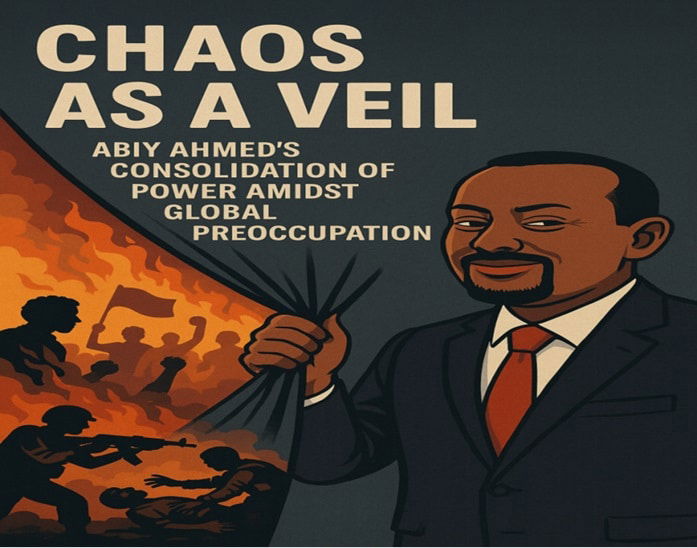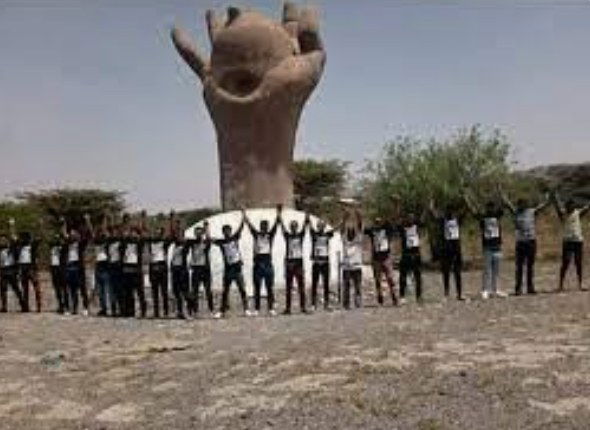Amsal Woreta
June 19, 2025
Ethiopian Prime Minister Abiy Ahmed is intensifying his grip on power, a move increasingly evident through new legislation and strategic international alliances. While the world’s attention focuses on global hotspots, Abiy’s administration is implementing policies that critics argue that curtail civil liberties and suppress dissent, echoing the Amharic proverb, “ግርግር ለሌባ ይመቻል” (Gereger le leba yemechal), meaning “Chaos is convenient for a thief.”

Ethiopia’s New Anti-Terror Law: A Tool for Control?
On June 18, 2025, the Ethiopian Parliament passed a new law aimed at Preventing and Suppressing Money Laundering and Financing of Terrorism. While the government claims this aligns with international standards and combats illicit financial flows, critics express serious concerns about its potential for abuse:
- Broad Interrogation Powers and Legal Immunity:The law grants extensive interrogation powers to covert agents, allowing “all available methods” short of killing, and provides legal immunity for all crimes except murder. This raises fears of state-sanctioned torture, extrajudicial killings, and a severe crackdown on dissent, fundamentally undermining due process and accountability.
- Retrospective Application:Investigations can now extend up to 10 years back, creating an atmosphere of fear and uncertainty. This provision could be used to target individuals based on past affiliations or actions, regardless of their status.
- Freezing Transactions Without Court Order: The Financial Intelligence Service can freeze “suspicious” transactions for up to seven days without judicial oversight. This power is a significant concern for civil liberties and could easily be weaponized to financially cripple political opponents or critical organizations.
- Suppression of Dissent:Many observers believe this law is primarily a tool to further consolidate Abiy Ahmed’s power and suppress opposition. Journalists, human rights activists, and political figures are particularly vulnerable. It is seen as a continuation of previous anti-terror laws that have been widely criticized for their repressive nature.
- Economic Impact: Despite government arguments that the law will combat illicit finance, the fear of arbitrary seizures and a lack of due process could deter foreign investment and harm the Ethiopian economy.
Abiy Ahmed’s Trajectory: From Reformer to Consolidator
Abiy Ahmed Ali’s political journey began in Beshasha, Ethiopia. Born to a Muslim Oromo father and a Christian mother, he joined the armed struggle against the Marxist-Leninist Derg regime at an early age, affiliating with the Oromo People’s Democratic Organization (OPDO), part of the broader Ethiopian People’s Revolutionary Democratic Front (EPRDF) coalition. He served in the Ethiopian National Defense Force, specializing in intelligence and communications, and eventually rose to head the Information Network Security Agency (INSA). He claims to hold multiple degrees, including a doctorate in peace and conflict research.
Under TPLF Rule
The Tigray People’s Liberation Front (TPLF) dominated the EPRDF coalition, which governed Ethiopia for 27 years (1991-2018). During this period, Abiy Ahmed held various positions within the TPLF-led government and security apparatus. As a prominent figure within the OPDO—one of the four ethnic-based parties in the EPRDF—he was, in a sense, a product of the TPLF system. However, the Oromo wing eventually challenged the TPLF’s hegemony.
A Turn Against Allies: The Amhara Divide
Abiy Ahmed’s ascent to power in 2018 was fueled by widespread popular protests, particularly from the Oromo and Amhara communities, who felt marginalized and oppressed under the TPLF. Initially, he was hailed as a reformer, promising an end to authoritarianism and ethnic politics. He freed political prisoners, lifted press censorship, and pursued peace with Eritrea, earning him the Nobel Peace Prize in 2019.
However, his relationship with those who propelled him to power, especially the Amhara, has soured considerably:
- Shift from Anti-TPLF Alliance:Abiy initially allied with the Amhara Fano militia and Amhara Special Forces during the Tigray War (2020-2022). This alliance was partly driven by Amhara’s long-standing grievances against the TPLF, including territorial disputes over areas like Wolkait, Tsegede, and Humera, and alleged atrocities against Amhara civilians.
- The Pretoria Agreement and Perceived Betrayal:The November 2022 Pretoria Peace Agreement, which ended the conflict between the federal government and the TPLF, was a critical turning point. Amhara political groups felt excluded from the peace process and betrayed by its terms. They perceived that the agreement did not adequately address their territorial claims and that the government’s subsequent actions—such as attempts to disarm Amhara Fano and special forces while allegedly allowing the TPLF to remain armed—were a pact against them.
- Current War in Amhara:Since April 2023, a full-blown armed conflict has erupted between Ethiopian government forces and the Amhara Fano. This conflict is driven by deep-rooted grievances, including political exclusion, ethnic-based killings, and displacement of Amhara people in various regions, particularly Oromia. The government declared a state of emergency in Amhara in August 2023, which has since been extended. There are widespread reports of human rights violations, including civilian killings, mass detentions, torture, and sexual violence by government forces.
- Ignored Massacres: Numerous reports and accusations of massacres and ethnic violence against Amhara civilians have emerged from various parts of Ethiopia, particularly the Oromia region, both before and during Abiy Ahmed’s premiership. Critics argue that Abiy’s government has ignored or downplayed these atrocities, often categorizing them as “inter-communal conflicts” rather than acknowledging their severity and ethnic targeting. Some human rights organizations and Amhara advocacy groups have even characterized these as acts of genocide.
Abiy Ahmed’s Changing Tone and Strategic Alliances
The shift in tone and public statements from Abiy Ahmed and his Prosperity Party (PP) members, including Army Chief Birhanu Jula, has become a growing concern:
- Unusual and Insulting Interviews: Recent interviews and public appearances where Abiy Ahmed appears to dismiss victims’ suffering or make insulting remarks are unusual for a head of state and have been met with outrage. This could signal detachment from reality or a deliberate strategy to project strength and deflect criticism amidst mounting pressure and international scrutiny.
- “Calling Names” and Diminishing the People:Reports of Prosperity Party members and high-ranking military officials like General Birhanu Jula using derogatory language or diminishing the grievances of the people, especially those in the Amhara region, are deeply problematic. Such rhetoric can inflame tensions, delegitimize opposition, and dehumanize those suffering, suggesting an unwillingness to engage in genuine dialogue or acknowledge legitimate grievances. This aggressive stance, coupled with the new repressive law and dismissive public statements, could be interpreted in several ways:
- Consolidating Power: It may be an attempt to project absolute control and quash any opposition, suggesting a secure power base.
- Losing Control: Conversely, it could indicate that he is losing control and resorting to increasingly authoritarian and desperate measures to maintain power as challenges mount from various fronts (the Amhara conflict, Oromo Liberation Army (OLA) insurgency, and economic woes). Ethiopia faces multiple internal conflicts and a deteriorating humanitarian situation, suggesting a leadership under significant pressure.
- Miscalculation:His actions and statements could be a serious miscalculation, alienating key segments of the population and exacerbating existing divisions, pushing the country deeper into instability.
The Ethiopia-Iran Security Deal: A Timely Alliance
On May 6, 2025, Ethiopia and Iran signed a significant Memorandum of Understanding (MOU) on security and intelligence cooperation. This agreement, coming directly amidst heightened Middle East tensions, involves their national police agencies collaborating on combating cross-border crime, sharing intelligence, and building capacity through joint raining.
For Ethiopia, the timing is crucial. The country faces persistent internal conflicts with ethnic militias, including the Amhara Fano and Oromo Liberation Army (OLA), and renewed hostility with neighboring Eritrea. This deal is expected to bolster the Ethiopian government’s ability to combat internal threats more effectively, leveraging Iranian expertise in oppressive policing tactics, crowd control, digital surveillance, and suppressing dissent—capabilities honed over decades by the Iranian regime.
From Iran’s perspective, this MOU marks a strategic expansion of influence in the Horn of Africa. Ethiopia has served as a gateway for Iran since 2016, and this security pact deepens those ties, building on past military aid, including drone transfers that aided Ethiopia during the 2020-2022 Tigray War. The agreement highlights Ethiopia’s pragmatic foreign policy, seeking support from various international actors, even those with rivalries. However, it also raises concerns among some international observers about the implications for human rights and regional stability, particularly given Iran’s record, and the ongoing internal strife in Ethiopia.
Abiy Ahmed’s Enduring Quest for Centralized Power
The security deal with Iran is not an isolated incident but fits into a broader pattern of power consolidation that has characterized Abiy Ahmed’s premiership since 2018. Despite initially being lauded as a reformer and Nobel Peace Prize laureate, Abiy’s governance has increasingly faced accusations of democratic backsliding, human rights abuses, and a push toward centralized authority.
Key elements of this power consolidation include:
- Suppression of Dissent:Reports from human rights organizations like Human Rights Watch indicate ongoing human rights violations, media censorship, internet shutdowns, and arbitrary arrests, particularly targeting ethnic groups like the Amhara and Oromo.
- Disarmament of Regional Forces:Abiy’s efforts to absorb regional special forces into the federal army or police have been a significant source of renewed conflict, as seen in the Amhara region. This move directly enhances the federal government’s security powers over regional leaders.
- Controversial Geopolitical Moves: TheJanuary 1, 2024, MOU with Somaliland for Red Sea access, while not a domestic law, stirred significant regional tensions and can be viewed as a bold, nationalistic play by Abiy to garner domestic support and enhance Ethiopia’s strategic position.
- Restructuring of Political Landscape:Abiy dissolved the ruling Ethiopian People’s Revolutionary Democratic Front (EPRDF) coalition and formed the Prosperity Party in 2019, centralizing power within a single party and sidelining ethnic-based political structures.
- Centralization of Resources and Accountability:Abiy has launched projects with parallel budgets, not subject to parliamentary oversight, and established
- an anti-corruption committee directly reporting to his office, further enhancing his leverage over the bureaucracy and potential dissenters.
“ግርግር ለሌባ ይመቻል”: Chaos as an Opportunity?
The Amharic proverb, “ግርግር ለሌባ ይመቻል” – “Chaos is convenient for a thief” – offers a lens through which to view Abiy Ahmed’s actions. While no singular, restrictive “new law” has been definitively linked to the immediate escalation of the Israel-Iran conflict, the broader context suggests a leader capitalizing on a distracted international community.
The world’s attention on the Middle East conflict provides a backdrop against which:
- The Ethiopia-Iran security deal could be formalized with less immediate international scrutiny than it might otherwise receive. This pact provides Addis Ababa with tools to address internal insurgencies, a critical component of Abiy’s power maintenance.
- Ongoing security operations and suppression of dissent against ethnic militias might continue with less global outcry. When major powers are focused on a potential regional war, their capacity or willingness to intervene in or heavily criticize domestic affairs in other distant nations can be diminished.
- Strategic domestic reforms or controversial policy implementations might proceed with less international pressure.
International reactions to Abiy’s governance in 2024-2025 reflect a growing concern. While some countries engage in diplomatic tours with Ethiopia for investment and development, others, like the UK, have recently refused meetings with Abiy Ahmed over human rights concerns, signaling a firmer stance against his government’s practices. This suggests that while global crises may offer windows of opportunity, the long-term implications of Abiy’s power consolidation and human rights record continue to draw scrutiny.
Conclusion
Abiy Ahmed’s recent actions, culminating in the security agreement with Iran, underscore a determined effort to fortify his power base amidst a volatile domestic and international environment. The coincidence of these moves with major global events like the Israel-Iran tensions certainly aligns with the spirit of “ግርግር ለሌባ ይመቻል.” Whether by design or fortunate timing, the focus of the world on one crisis can indeed provide a leader with the space to enact policies that serve their own consolidation of power, often with significant implications for human rights and democratic norms. The challenge for the international community lies in maintaining vigilance and accountability, even when global attention is elsewhere.

